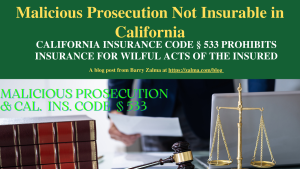Malicious Prosecution Not Insurable in California

See the full video at https://rumble.com/v2ea5rw-malicious-prosecution-not-insurable-in-california.html and at https://youtu.be/-S5NoSvtdMY
Aspen Specialty Insurance Company appealed from the district court order dismissing its complaint against Miller Barondess, LLP, and several of its partners (collectively “MB”). Aspen appealed to the Ninth Circuit in Aspen Specialty Insurance Company v. Miller Barondess, LLP Louis R. Miller; James Goldman; Alexander Frid; Jason Tokoro, No. 22-55032, United States Court of Appeals, Ninth Circuit (March 15, 2023) who interpreted California Insurance Code § 533 as it related to a suit for malicious prosecution.
DISCUSSION
Under California statutory law, “[a]n insurer is not liable for a loss caused by the wilful act of the insured.” [Cal. Ins. Code § 533.]
Section 533 is considered a statement of the public policy of the state of California. It was enacted to prevent encouragement of wilful torts.
Section 533 is a codification of the jurisprudential maxim that no man shall profit from his own wrong. It is an implied exclusionary clause which, by statute, must be read into all insurance policies. As a result, the parties to an insurance policy cannot contract for such coverage.
THE TRIAL COURT
The district court concluded that § 533 did not apply because there was no final adjudication that the insureds engaged in malicious prosecution. The California Court of Appeal had concluded that § 533 precluded indemnification for an underlying malicious prosecution action, even though the matter had been settled without a final adjudication. California precedent confirmed that courts examine the allegations of the underlying complaint, not whether there has been an adjudication of the allegations, in determining whether § 533 bars coverage. Insurance coverage is precluded by Insurance Code § 533 as a matter of law.
The underlying complaint against MB alleged malicious prosecution, which is categorically a willful act within the meaning of § 533. This is so because malicious prosecution requires a wilful act.
DISCUSSION
Since the malicious prosecution action was not based on an innocent party’s vicarious liability for the wrongdoing of another the complaint alleged that the insureds themselves, not an agent or third party, engaged in the acts of malicious prosecution. For example, the complaint alleged that the insured knowingly submitted NMS’ perjured testimony to the trial court, and actively and knowingly assisted NMS in its fraudulent and malicious scheme.
The law firm thus could have been vicariously liable for the partner’s conduct. There was no question that the MB partners were acting in their capacity and within their authority when they litigated the action that became the subject of the malicious prosecution allegations.
The district court order dismissing Aspen’s complaint was reversed and the matter remanded for further proceedings and Aspen was awarded its costs on appeal.
When a law firm maliciously brings an action a knowing that the action is false and fraudulent and then presents false, perjured evidence in an attempt to prove the false case, it has acted wilfully and maliciously against the defendant. When the law firm lost the suit the defendant sued seeking damages for malicious prosecution and the lawyers sought defense and indemnity from its insurer. The Ninth Circuit found that since malicious prosecution is always wilful, § 533 prevented the insurer from defending or indemnifying the law firm Miller Barondess, LLP and lawyers Louis R. Miller; James Goldman; Alexander Frid; Jason Tokoro.
 (c) 2023 Barry Zalma & ClaimSchool, Inc.
(c) 2023 Barry Zalma & ClaimSchool, Inc.
Subscribe and receive videos limited to subscribers of Excellence in Claims Handling at locals.com https://zalmaoninsurance.locals.com/subscribe.
Consider subscribing to my publications at substack at https://barryzalma.substack.com/publish/post/107007808
Barry Zalma, Esq., CFE, now limits his practice to service as an insurance consultant specializing in insurance coverage, insurance claims handling, insurance bad faith and insurance fraud almost equally for insurers and policyholders. He practiced law in California for more than 44 years as an insurance coverage and claims handling lawyer and more than 54 years in the insurance business. He is available at http://www.zalma.com and zalma@zalma.com
Follow me on LinkedIn: www.linkedin.com/comm/mynetwork/discovery-see-all?usecase=PEOPLE_FOLLOWS&followMember=barry-zalma-esq-cfe-a6b5257
Write to Mr. Zalma at zalma@zalma.com; http://www.zalma.com; http://zalma.com/blog; daily articles are published at https://zalma.substack.com. Go to the podcast Zalma On Insurance at https://anchor.fm/barry-zalma; Follow Mr. Zalma on Twitter at https://twitter.com/bzalma; Go to Barry Zalma videos at Rumble.com at https://rumble.com/c/c-262921; Go to Barry Zalma on YouTube- https://www.youtube.com/channel/UCysiZklEtxZsSF9DfC0Expg; Go to the Insurance Claims Library – https://zalma.com/blog/insurance-claims-library.
Like this:
Loading…
Related
About Barry Zalma
An insurance coverage and claims handling author, consultant and expert witness with more than 48 years of practical and court room experience.







